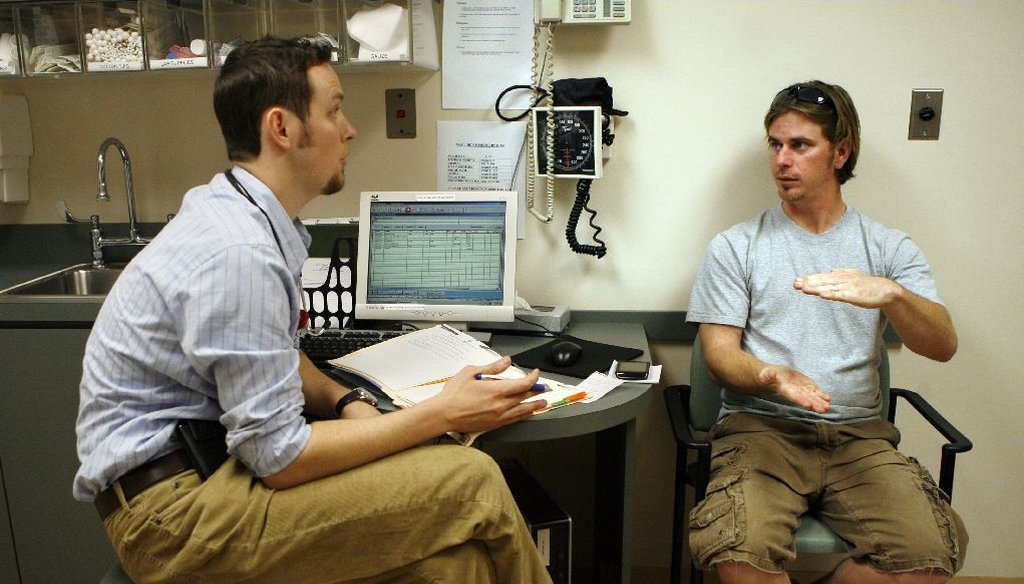Stand up for the facts!
Our only agenda is to publish the truth so you can be an informed participant in democracy.
We need your help.
I would like to contribute

Do you like your health plan? President Barack Obama has said you can keep it under the new health care law, but Republicans say lots of Americans will have to switch. We find both sides aren't entirely accurate.
In 2009, President Barack Obama memorably said that under the Democratic-steered health care overhaul, "if you like your health care plan, you can keep your health care plan." It’s the catchphrase that’s since launched a raft of Republican rejoinders -- even now, a year after the legislation was passed.
Recently, PolitiFact National spotted a fresh rejoinder in an op-ed article by U.S. Rep. Blake Farenthold, a freshman Republican from Corpus Christi: "Despite claims that you can 'keep the health care plan you like,' the Obama administration has predicted that as many as 7 out of 10 Americans with employer-provided health coverage could lose their current health plan."
Reporter Louis Jacobson decided the claim was worth checking, including a look at a key question: How frequently do people with employer-provided health coverage see a change in their health care in any given year, irrespective of the new law?
This issue is important because the notion that "if you like your health care plan, you can keep your health care plan" strongly suggests that people today -- even before the law fully kicks in -- can keep their health plan if they like it.
Jacobson discovered that data on this question is surprisingly scarce, given how high-profile the health care bill has been over the past few years. But he sifted the numbers as best he could.
A mid-1990s study by the U.S. Census Bureau’s Survey of Income and Program Participation, found that 26.3 percent of fully employed Americans lacked health coverage for at least one month within a 48-month period studied. That statistic doesn’t include people who switched jobs (and thus health plans) without actualy losing coverage -- something that’s common in an economy in which a bit over 3 percent of employees leave their job in any given month, according to the Bureau of Labor Statistics.
It also doesn’t count those who stayed in the same job but whose company changed insurance carriers or whose insurance carriers changed the terms of their client company’s plan. The Medical Expenditure Panel Survey, sponsored by the U.S. Department of Health and Human Services, found that in 2007, just over 14 percent of the entire U.S. population "switched" health insurance coverage. However, this included people of all ages, including seniors, who rarely switch out of Medicare. So for the population that Farenthold referenced -- Americans who get their plan through an employer -- the rate of switching is almost certainly higher.
Another survey of employers by Mercer, a private consulting firm, found that in each of the years from 2005 to 2008, roughly 25 percent of companies said they made changes to their plans that would result in employees paying a greater share of the cost. In 2009 and 2010, that percentage rose to one-third of companies each year.
So if you add up the workers who lose coverage entirely, who change jobs, who work for companies that change insurance carriers or plan terms significantly, or whose employer’s insurance carrier is merged or bought out, a significant number of Americans were already losing "their current health plan" in any given year before the new law was passed. The data is too scattershot to know how large or small this percentage is, but it seems reasonable to assume that the number is not trivial.
But Farenthold is not entirely to blame for this lack of context in this talking point.
By saying, "If you like your health care plan, you can keep your health care plan," Obama set up an unrealistic perception of what the health care bill would do -- and gave his opponents a golden opportunity to make the bill’s impact seem problematic. Eventually, Obama changed his argument somewhat, saying that if you "already have health insurance through your job, Medicare, Medicaid, or the VA, nothing in this plan will require you or your employer to change the coverage or the doctor you have."
But as Farenthold’s claim demonstrated, it was already too late -- his opponents had already seized on the initial comment and cited it repeatedly. And a long-lived -- and seemingly effective -- talking point was born. PolitiFact rated the statement False.
Our Sources
PolitiFact National, Truth-O-Meter article, "Rep. Blake Farenthold says health care law will force 70 percent of workers to lose their current plan," Feb. 2, 2011







































